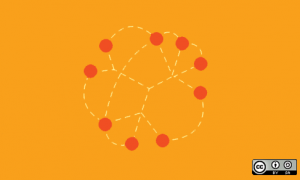By Laura J. Wilkinson

Image adapted from the original, by opensource.com.
Have you ever clicked on a link to a research article, only to find a 404 – page not found error? Or arrived on a publisher’s homepage rather than the article you were looking for?
That’s because links to research content located on the web are not always reliable and can break if a journal moves publisher, a platform gets restructured, or if the link contains an error.
A DOI, or digital object identifier, is a persistent link to a research object, such as a journal or journal article, dataset, book or book chapter, conference proceedings, report, dissertation, preprint, or peer review.
A DOI is:
- Unique – it relates to specific content
- Persistent – it reliably endures into the future, and
- Resolvable – it provides access to the information object (which may be open access or subscription access).
The DOI for a research object remains constant, even if its platform location or other metadata change, so using a DOI to refer to it provides a more stable link than simply using its URL.
How does a DOI achieve persistent linking? This happens when metadata about the object (including the URL where the item can be found) is associated with its DOI. This metadata is deposited and updated by the publisher with Crossref.
But not all DOIs are made equal—there are other DOI registration agencies that are members of the International DOI Foundation—but Crossref offers a broad range of infrastructure and services that specifically support scholarly content, citation, and provenance. Some agencies will specialize in a particular region or language or content type, and some support different industries such as construction, or movies.
Crossref’s mission is to make research outputs easy to find, cite, link, assess, and reuse. Everything we do, we do specifically to help make greater connections: between content types; between countries; between disciplines; and between people. Therefore becoming a Crossref member means committing to certain member obligations. These include not only agreeing to deposit comprehensive and accurate metadata, but also to keep it up-to-date. This way DOIs can be relied upon to create an online network of connected research activity. Members also commit to use Crossref DOI links in their references, increasing the number of persistent links between scholarly content across more than 10,500 fellow members.
All of this helps to create a research record which is robust, promotes the discovery and visibility of the component parts, and facilitates interoperability.
Get involved and participate in this global research network by using the Crossref DOI, rather than the URL, whenever you cite a research object. Look for and use the DOI link!
Example – to link to this article:
Lim Megan S C, Hellard Margaret E, Aitken Campbell K. The case of the disappearing teaspoons: longitudinal cohort study of the displacement of teaspoons in an Australian research institute BMJ 2005; 331 :1498
The URL is <https://www.bmj.com/content/331/7531/1498>
The DOI is <https://doi.org/10.1136/bmj.331.7531.1498> <- use this link!
This blog is the second in a series of five posts from Crossref; over the next few months we’ll be talking to them more in depth about the role of the DOI, particularly in terms of
- how DOI and Crossref came to be,
- the identification of different content versions of an article such as preprints, formats and languages,
- options for acquisition, and
- how journals can exploit DOIs using Crossref services.
References
TOLWINSKA, A. Linking references is different from depositing references [online]. Crossref blog, 2018 [viewed 2 August 2018]. Available from: https://www.crossref.org/blog/linking-references-is-different-from-depositing-references/
Member obligations [online]. Crossref. 2018 [viewed 2 August 2018] Available from: https://www.crossref.org/member-obligations/
External links
Crossref <https://www.crossref.org/>
Crossref Dashboard <https://www.crossref.org/dashboard/>
Digital Object Identifier <https://en.wikipedia.org/wiki/Digital_object_identifier>
DOI Registration Agencies <https://www.doi.org/registration_agencies.html>
Laura J. Wilkinson <https://orcid.org/0000-0002-8922-7839>
About Laura J. Wilkinson
Laura J. Wilkinson is Crossref’s Education Manager, designing and delivering our education strategy to maximise members’ understanding of and participation in Crossref. Her previous experience includes education and outreach at ORCID, roles in academic libraries from e-resources management to law librarian, and being a science teacher.
Como citar este post [ISO 690/2010]:













Recent Comments